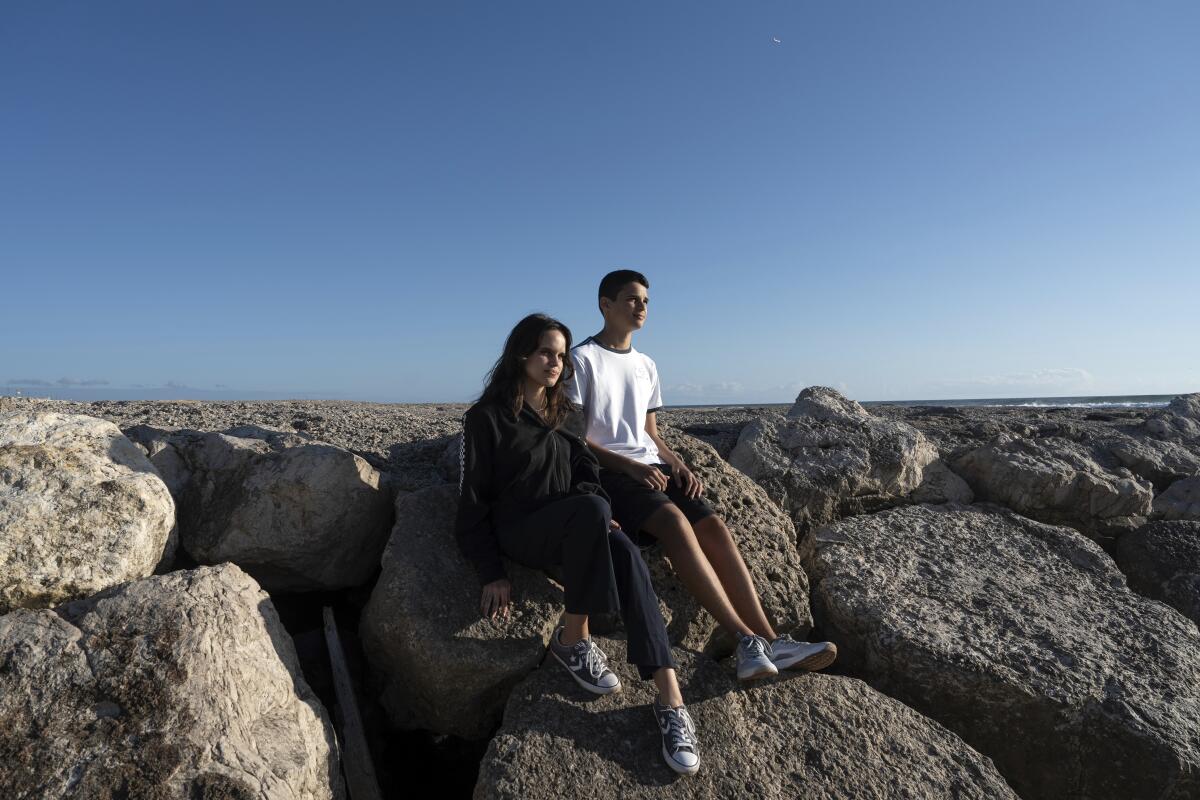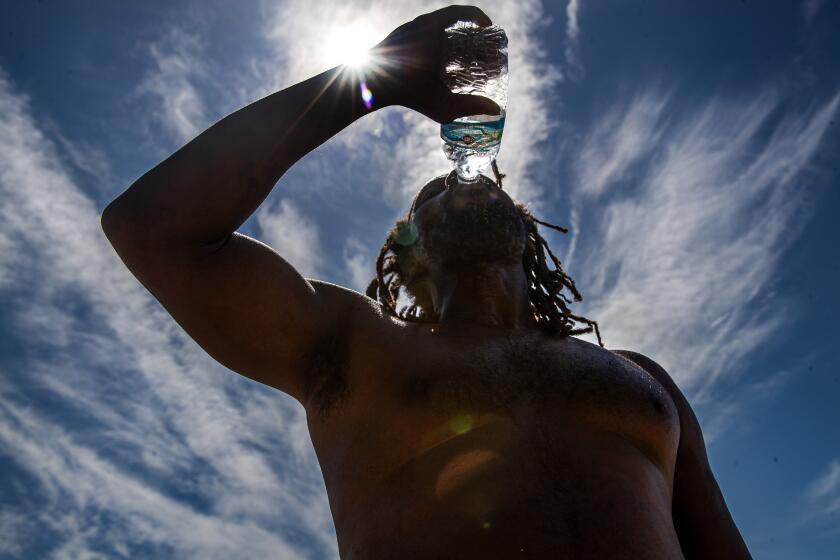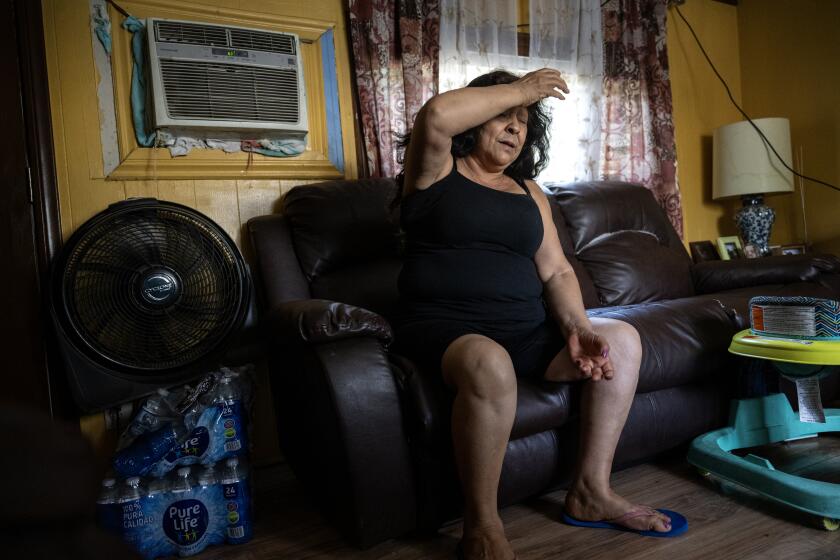In unprecedented case, young climate activists taking 32 governments to human rights court

- Share via
COSTA DA CAPARICA, Portugal — Sofia Oliveira was 12 years old when catastrophic wildfires in central Portugal killed more than 100 people in 2017.
She “felt it was now or never to raise our voices” as her country appeared to be in the grip of deadly human-caused climate change.
Sofia, now a university student, and five other Portuguese young adults and children between 11 and 24 are accusing 32 European governments of violating their human rights for what they say is a failure to adequately address climate change. The climate activists are due Wednesday at the European Court of Human Rights for the first climate change case filed with the court, which could compel action to significantly slash emissions and build cleaner infrastructure.
Victory for the activists in Strasbourg would be a powerful instance of young people taking a legal route to force their governments to adopt a radical recalibration of their climate measures.
The court’s rulings are legally binding on member countries, and failure to comply makes authorities liable for hefty fines decided by the court.
The courts are increasingly seen by activists as a way of sidestepping politics and holding governments to account.
Last month, in a case brought by young environmental activists, a judge in Montana ruled that state agencies were violating their constitutional right to a clean and healthful environment by allowing fossil fuel development.
The ruling adds to a small number of legal decisions around the world that have established a government duty to protect citizens from climate change.
When the Portuguese group decided in 2017 that they would pursue legal action, Sofia had braces, stood taller than her younger brother André and was starting seventh grade. The braces are long gone and André, who is now 15, is taller than she is by about an inch.
The last six years, André noted in an interview, represent almost half of his life.
What has kept them going through the piles of legal documents gathered by the nonprofit group supporting them and through lockdowns during the COVID-19 pandemic is what they call the pressing evidence all around them that the climate crisis is getting worse.
The Praia do Norte beach at Costa da Caparica near where Sofia and André live, just south of the Portuguese capital, Lisbon, was about 3,000 feet long when his father was his age, André says. Now, amid coastal erosion, it measures less than 1,000 feet. Evidence like that led him to attend climate demonstrations even before he became a teen.
The other four members of the Portuguese group — Catarina, Cláudia, Martim and Mariana — are siblings and cousins who live in the region of Leiria in central Portugal where summer wildfires are common.
Toward a more sustainable California
Get Boiling Point, our newsletter exploring climate change, energy and the environment, and become part of the conversation — and the solution.
You may occasionally receive promotional content from the Los Angeles Times.
Scientists say the climate of the Sahara is jumping across the Mediterranean Sea to southern European countries like Portugal, where average temperatures are climbing and rainfall is declining. Portugal’s hottest year on record was 1997, followed by 2017. The four driest years on record in the country of 10.3 million people have all occurred since 2003.
It’s a similar story across Europe, and the legal arguments of the six Portuguese are backed by science. The Earth sweltered through its hottest Northern Hemisphere summer ever measured, with a record warm August capping a season of brutal and deadly temperatures, according to the World Meteorological Organization.
The world is far off its pledge to curb global warming, scientists say, by cutting emissions in line with the requirements of the 2015 Paris climate accord. Estimates say global average temperatures could rise by 2.6 to 7.2 degrees Fahrenheit since preindustrial times by 2100 at current trajectories of warming and emissions reduction plans.
More than 6.5 billion people — 81% of the global population — experienced climate change-attributed heat in July 2023, according to a new report from Climate Central.
Among the specific impacts listed by the young Portuguese are being unable to sleep, concentrate, play outside or exercise during heat waves. One of their schools was closed temporarily when the air became unbreathable because of wildfire smoke. Some of the children have health conditions such as asthma that makes them more vulnerable to heat and air pollution.
They are being assisted by the Global Legal Action Network, an international nonprofit organization that challenges human rights violations. A crowdfunding campaign has drawn backing from around the world, with messages of support coming from as far away as Japan, India and Brazil.
Gerry Liston, a legal officer with the action network, says the 32 governments have “trivialized” the case.
“The governments have resisted every aspect of our case … all our arguments,” he said.
André describes the governments as “condescending.” Sofia adds: “They don’t see climate as a priority.”
Will California’s efforts to adapt to climate change move the needle? Our experts have answers.
Portugal’s government, for example, agrees the state of the environment and human rights are connected but insists the government’s “actions seek to meet its international obligations in this area” and cannot be faulted.
At the same time, some governments in Europe are backsliding on commitments already made.
Poland last month filed legal challenges aimed at annulling three of the European Union’s main climate change policies. Recently, the British government announced it is delaying by five years a ban on new gas and diesel cars that had been due to take effect in 2030. The Swedish government’s budget proposal, meanwhile, cut taxes on gas and diesel and reduced funding for climate and environmental measures.
As summer temperatures soar, supplying electricity has become an intractable problem for countries like Iraq and Iran, where people sweat and stew.
Amid those developments, the courts are seen by activists as a recourse.
The London School of Economics says that globally, the cumulative number of climate change-related cases has more than doubled since 2015 to more than 2,000. Around one-fourth were launched between 2020 and 2022, it says.
The Portuguese activists, who are not seeking any financial compensation, will probably have to wait some more. The verdict in their case could take up to 18 months, though they see the court’s decision in 2020 to fast-track the proceedings as an encouraging sign.
A precedent is also giving the activists heart. The Urgenda Foundation, a Dutch organization that promotes sustainability and innovation, brought against the Dutch government the first case in the world in which citizens argued that their leaders have a legal obligation to prevent dangerous climate change.
The Times publishes a series of articles detailing the ways we can all help address the climate change challenge.
In 2019, the Dutch Supreme Court found in Urgenda’s favor, ruling that the emissions reduction target set by the government was unlawfully low. It ordered authorities to further reduce emissions.
The government consequently decided to shut down coal-fired power plants by 2030 and adopted billion-euro packages to reduce energy use and develop renewable energy, among other measures.
Dennis van Berkel, Urgenda’s legal counsel, accused governments of choosing climate change targets that are “politically convenient” instead of listening to climate scientists. Judges can compel them to justify that what they are doing on climate issues is enough, he said.
“Currently there is no such scrutiny at any level,” he told the AP. “That is something incredibly important that the courts can contribute.”
More to Read
Sign up for Essential California
The most important California stories and recommendations in your inbox every morning.
You may occasionally receive promotional content from the Los Angeles Times.


















